On May 6, the coronation of British King Charles III will take place in London. On this day, people from all over the world will witness magnificent processions and traditions that have been observed for more than a thousand years. Representatives from various countries, including Azerbaijan, will take part in the coronation of Charles III.
In an interview with Report, British Ambassador to Azerbaijan Fergus Old spoke in detail about this historic event, as well as about the priorities for the development of cooperation between the countries.
- What are the main priorities of cooperation between the UK and Azerbaijan? Have they changed this year?
- The priorities that I laid out when I arrived in Azerbaijan are really still the priorities that exist now. I laid those out in alphabetical order:
A is for Azerbaijan.
B is for business. We're looking to boost British exports to Azerbaijan and to help the country to work on its own business environment to make it a more attractive place for international companies to do business.
C is for climate change and energy security. That continues to be a huge focus for us.
D is for demining, drugs and defense. We continue to cooperate very closely with the State Border Service and State Customs Committee of Azerbaijan trying to stop the flow of illegal drugs coming over Azerbaijan's southern border and heading on to the UK. Demining again has been a big focus of our efforts. Defense engagement is something that we are looking to ramp up all the time. There's a number of different aspects of that.
E is for education. We are looking forward to welcoming Science and Education Minister of Azerbaijan Emin Amrullayev to the UK this weekend for the Education World Forum. The Education World Forum is a big global annual event that the British Council is involved in organizing here, so he will be leading the Azerbaijani delegation there.
G is for gender, for girls and women. That also continues to be a big priority for us, both women's economic empowerment and women, peace and security.
You know, in terms of those overall priorities; they stay the same. As an ambassador: no two days are the same and we have some big things ahead of us. The Coronation is the first of those on Saturday. The next Saturday we are hosting the Eurovision Song Contest on behalf of Ukraine.
Ukraine will be uppermost in our minds as it has been through the last year of Russia's illegal and barbaric invasion. Ukrainian women and children, and civilians continue to lose their lives. There continues to be a massive disruption of energy and food security globally as a result of that war.
Eurovision Song Contest is also an opportunity to highlight what's happening in Ukraine. Of course, that's also a celebration of music and culture. It's a celebration of inclusivity. We're very much looking forward to hosting an event on here for that as well. And I was very lucky that just a few weeks ago I got to meet Tural and Turan up in Zagatala. So, I'm going to be rooting for them in their first semifinal next week.
Then we've got something we're doing for the first time, “Ambassador for a day”. We've had a competition where we haven't yet finalized our selection of that ambassador, but it will be a young woman who will come and join me for the day being the British ambassador. We hope that's going to encourage lots more young women to be inspired to be an ambassador and recognize what they can do.
And then at the end of the month, we have got the latest visit by Baroness Nicholson, the Prime Minister's trade envoy. She's coming to lead an energy transition delegation to Energy Week here in Baku. This month is a particularly busy one.
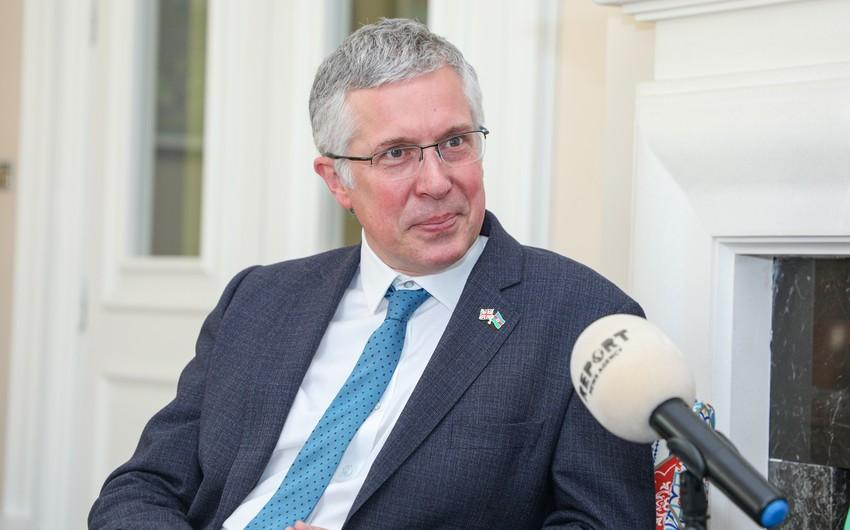
- You've also mentioned exports. I wonder what are UK’s export/import priorities when it comes to Azerbaijan?
- Yeah. Our business year runs from the beginning of April until the end of March. In the first month of the year, we've already seen some big export wins in different fields including in transport and agricultural machinery. We identified with the Azerbaijani government as part of our Joint Intergovernmental Commission that we want to help the country to diversify away from the oil and gas sector. Of course, that continues to be a really important sector for Azerbaijan and for UK companies.
But we see the growth areas as healthcare, IT, infrastructure, and clean energy.
- Do you think Brexit has affected this process or the growth of mutual trade between the countries? Has anything changed in that regard?
- Over the last 30 years, the UK has invested $85 billion into the Azerbaijani economy. We are the largest single foreign direct investor over that time. Of course, the economic environment has changed enormously. In the last few years even since Brexit, we've had the COVID-19 pandemic and we still see the impact of the war in Ukraine. So, there are other external factors. Brexit is a factor in terms of how we trade with the EU, but in terms of the UK and Azerbaijan, the fundamentals of the relationship are strong. There is huge potential for growth still.
We are close to agreeing the partnership and cooperation agreement with Azerbaijan. But there are just a couple of small things that hold things up. We hope that we will be able to conclude that agreement very soon. That's an agreement, particularly about the trading relationship, but more broadly there is huge cooperation ongoing in many different areas.
- How do you think it is possible to increase UK investments in Azerbaijan and make the Azerbaijani market more attractive for UK companies?
- We want to make this a more attractive environment for British and other international businesses. We think there are a couple of really important elements to that. It's important that there is good clear communication between government and business. With the Azerbaijani authorities and with our British Chambers of Commerce in Azerbaijan we have a couple of working groups, one that looks at tax issues, one that looks at customs issues.
Those are often areas that international companies, including British companies, focus on where they think some adjustments can be made that will make this a more attractive environment.
We also have to note that last year Azerbaijan had its lowest score in the Transparency International Corruption Perceptions Index in 10 years. We think that the government's anti-corruption plan is an important step for addressing perceptions and addressing the reality.
We also organized a couple of workshops through the British Standards Institute, one in Ganja and one in Baku a few months ago. Those were very well attended by both private sector and public sector players here.
Those perceptions have an impact on how international investors and businesses view Azerbaijan as a place to do business. We see that there are some practical things that we can do together to improve that image.

- The UK is considering to expand the cooperation with Azerbaijan in the field of e-commerce, cybersecurity, and smart cities and villages, as well as in the development of a fintech project between TheCityUK and the Central Bank of Azerbaijan, implemented last year. At what stage is this process?
- Technology is an area where the UK is looking for wider cooperation. Azerbaijan's ICT sector is strong and growing and being driven by increasing levels of technology adoption, a tech and digital-enabled population, e-government initiatives as well as public and private sector investment to improve competitiveness. UK tech companies are already working in partnership with local technology companies. Our aim is to expand this cooperation and raise awareness about Azerbaijan market opportunities in the UK. For example, UK tech companies have already expressed an interest in attending Azerbaijan's Annual Innovation Summit in December, which brings together tech experts from across the world.
Last year, we took an ICT delegation to London Tech Week, which is a unique tech festival taking place in the UK. We hope that this year more local tech companies will be able to attend the event in June. Similarly, we led a high-level cyber inward mission to the UK comprising from delegates of Azerbaijani banks and cyber companies. This year we plan to organize a cyber-conference, inviting speakers from leading UK cyber companies, including business-to-business engagement. Cyber/IT security education and training providers and universities are open to the establishment of joint programs in Azerbaijan.
There is a report that was produced by the TheCityUK with a number of recommendations for the Central Bank and other players here in terms of improving the environment for financial inclusion.
On the Smart Cities front, we're collaborating with the State Committee on Urban Planning and Architecture SCUPA, particularly sharing UK’s expertise in digital construction.
This is an area in which I think there's interest in what the UK has to offer and with AI, with machine learning as really important developments that are changing both government and business in every sector. Now we think there's a really strong UK offer in those.
Just this week I went to ASAN 7 and met the head of the ASAN Service. What is happening in terms of E-government here, that delivery of public services to Azerbaijani citizens is really impressive. I think there are things that we can learn in both directions in that area.

- Are there plans to work on the use of ICT in agriculture?
- There is cooperation between the UK and Azerbaijan in the agricultural sector. It's one of the five sectors that we've identified where there's clearly a desire on this side to diversify the economy and we think that there is a UK business offer that can support that. And of course, IT, and modern technology is going to be a really important part in improving productivity, but also in improving the resilience and sustainability of Azerbaijani agriculture, more water-efficient, climate-resilient strains of crops are going to be a really important part of agricultural development in what is quite a water-stressed country. So that's an important area we're looking at too.
- How do you assess Azerbaijan's role in ensuring Europe's energy security?
- In my eight months here as an ambassador and beyond energy has been a central topic at the highest level across Europe, including in the UK. I have seen in my time a number of presidents, prime ministers, and energy ministers coming to Baku because they recognize the role that Azerbaijan is playing in energy security for Europe, particularly in Southern, Eastern, and Central European countries in terms of gas supplies.
As Russia has turned off the taps, Azerbaijan has been one of the countries that has been able to help. So, we really recognize and value that support for the European energy security.
What's really struck me as well, including at the Southern Gas Corridor conference that His Excellency the President hosted a few months ago, that was both looking at gas, but also for the first time looking at green energy. From His Excellency President Ilham Aliyev and excellent Energy Minister Shahbazov we can see that Azerbaijan is thinking not just about the ways to continue oil and gas exports but also beyond.
We were very pleased to have supported the World Bank and IFC report on offshore wind capacity in the Caspian. We're very proud that His Excellency, President quotes that figure of 157 gigawatts of wind offshore wind capacity that exists. Azerbaijan is thinking about future problems and how it needs to adapt its own economy, how it needs to attract investment and expertise in order to realize that vision. The UK will continue to be absolutely at the heart of that future, as well as the present and past of Azerbaijan's energy.
- How can the UK, as a provider of maritime security network in the Black Sea, contribute to the implementation of the agreement signed with Georgia, Hungary and Romania on the construction of an underwater energy cable in the Black Sea?
- The Black Sea is one of those areas that has been very badly disrupted by Russia's invasion of Ukraine. The normal peaceful transit of goods has been very disrupted. We see that in terms of grain supplies, we see that in terms of fertilizer supplies and we see that in terms of energy.
The UK for a long time has worked with a number of NATO partners that are littoral countries, so countries on the shores of the Black Sea, with Romania, with Bulgaria, with Türkiye and also with our NATO partner for peace country, Georgia.
So maritime security in the Black Sea is something that absolutely we see ourselves as a net provider of, and I think that will bring benefits for Azerbaijan as it undertakes these new strategic initiatives involving the Black Sea as well. In terms of a direct discussion between the UK and Azerbaijan on maritime security, we see that there are shared interests, threats and a possibility of cooperation to address those.
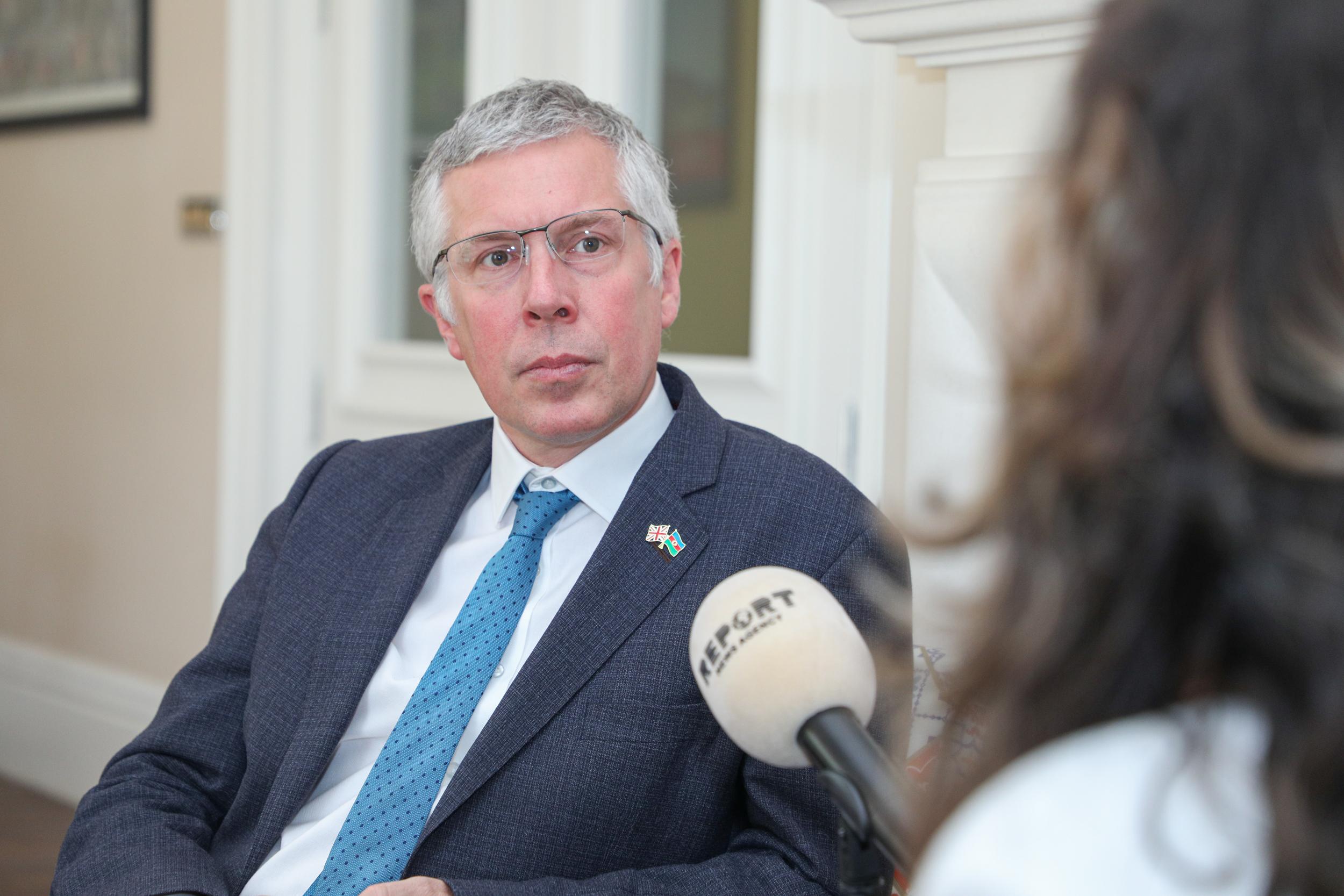
- How will the UK contribute to achieving Azerbaijan’s zero emission goal?
- We think that Azerbaijan has some really serious plans in terms of clean energy and net zero its targets for 30% generation of energy from renewable sources by 2030. We would like it to make that commitment in the UN framework as well to have a more ambitious nationally determined contribution. That's essentially the commitment that every country makes to the UN about what it's doing to tackle climate change.
But we also think that net zero commitment in terms of Azerbaijan is going to rebuild and reconstruct the recovered territories is a very serious offer. When you are building new infrastructure, when you're rebuilding with an almost blank canvas, that's when you can be really ambitious, you can be really forward-thinking about those net-zero targets.
We have been working in recent years in terms of exchanging expertise with the Azerbaijani government. Our energy regulator OfGem has worked with the Renewable Energy Agency here, helping them to design the best legislation to help citizens and businesses to create the right environment for new renewable energy goals to be successful.
We've been working with the Ministry of Ecology, specifically the Hydro Meteorology Department, in helping them to design the right ways to monitor and report greenhouse gas emissions in different sectors.
So partly it is about the sharing of expertise and how to design legislation and regulations for net zero. Partly also then we're working to raise awareness among the general population, particularly focusing on youth in terms of climate change.
We have had projects recently with our partners IDEA on young climate champions, there's a project going on that at the moment. We've also worked with Bravo and other private sector partners in terms of plastic-free shopping. The initiative to cut down the single-use plastic bags is a really important practical measure that we can all take. So, we see that our support for net zero has a number of different elements to it.

- The UK is working with Azerbaijan in demining and other issues. At what stage is this?
- I've had the opportunity in my 8 months here to visit Aghdam, Zangilan twice and Fuzuli, some of the other areas that border Karabakh. I've had the chance to see with my own eyes the scale of the challenge that exists, but also some really impressive work to address that challenge. I've been lucky enough to go with ANAMA to Zangilan, to Fuzuli, to Aghdam and see the fantastic work that they are doing.
We see that mine action as one of our top priorities here and it's an essential first step to making that Great Return a reality. As the UK, we've already provided £1,000,000 pounds of assistance on mine action in the last couple of years and we are looking to do more with further announcements in 2023 and 2024 in terms of that support.
A lot of that has been delivered through UNDP working with ANAMA in terms of landmine clearance. And there are also a number of British companies working in that sector. Just the sheer scale of the challenge, the huge area that's extremely heavily contaminated with mines means that having the international capacity and expertise both from the public sector and the private sector, building the capacity of local companies in order to be able to deliver that all just needs to happen at scale. So, we still see that ramping up.
As well as the landmine clearance, we also see that raising awareness of landmines is really important in order to that great return to happen safely. So, when I was in Aghaly village a couple of months ago, I was there with ANAMA and with UNICEF and we were doing some work raising awareness among the children at the school about the risks that they face from landmines and other unexploded ordnance. So, we see that raising awareness as well as clearing the landmines is absolutely two sides of the coin that need to happen.
Beyond that there are British companies involved in the master-planning of some of the cities in the recovered territories. We are hoping that BP will soon be able to sign off a major new solar power plant in Jabrayil, which will be a significant win both in terms of that reconstruction but also in terms of net zero more broadly. There's interest from the Azerbaijani government to attract international companies to be part of that reconstruction effort and there's certainly interest from a number of British companies in participating in that.
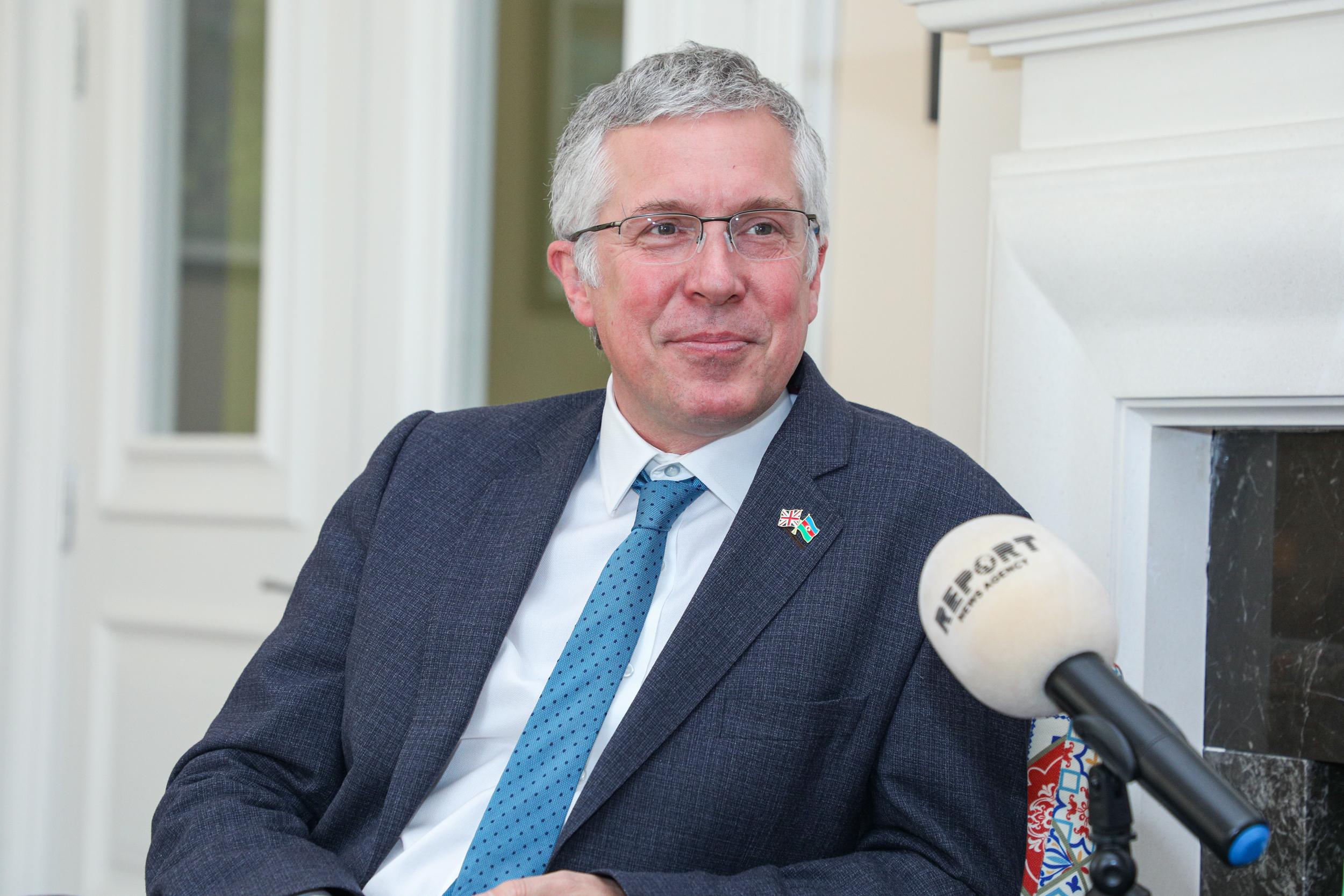
- Who will participate in the coronation ceremony of His Excellency King Charles III? Could you please tell us more about the coronation process?
- I had the misfortune, within two weeks of arriving here as an Ambassador, Her Majesty the Queen died and that was, of course, a huge moment for the UK.
It was a moment where I was very honored so early on in my time that His Excellency the President came to sign the condolence book for Her Majesty. We talked then about the gift of a Karabakh horse which had just been given for her 70th anniversary on the throne. It was a recognition of that connection at the highest level that exists between Azerbaijan and the UK. That was a historic but a very sad moment.
This week we are in celebratory mode. We've got world leaders coming from around the world to join us and help us celebrate what we hope will be a spectacular and happy day.
On Monday, I went to go and see Madam Speaker, Sahiba Gafarova. She will be representing His Excellency, the President and Azerbaijan at the coronation.
Of course, in the Azerbaijani Constitution, you have the President, you have the Vice President, and then you have the Speaker as in terms of seniority. So just as she represented Azerbaijan at the state funeral in September, we're also very much looking forward to welcoming her to London on Saturday for the coronation. And I don't think it's unreasonable to say that she was also very excited to be going.
On that day there will be a wonderful procession from Buckingham Palace in a horse-drawn carriage that was originally first used well over 250 years ago. The carriage will go up Paul Mall and then down Whitehall to Westminster Abbey. Westminster Abbey was first used for a coronation in 1066. So, there are all sorts of wonderful elements. It's one of those moments that brings together some of the best and most colorful elements of British culture and history.
But, of course, King Charles is very much a modern king. He's very focused on climate and sustainability issues. He's very focused on community and inclusivity. He's very focused on youth and the next generation. So, I think you will see all of those elements in terms of how the day is celebrated as well.
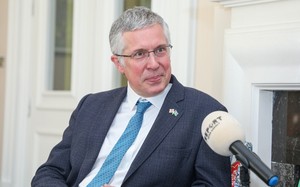

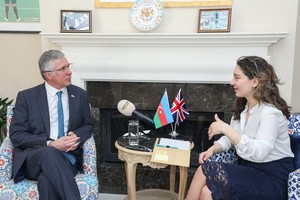
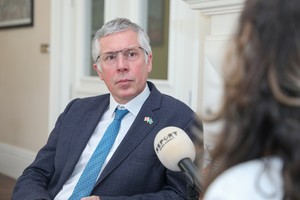
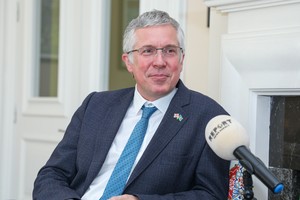



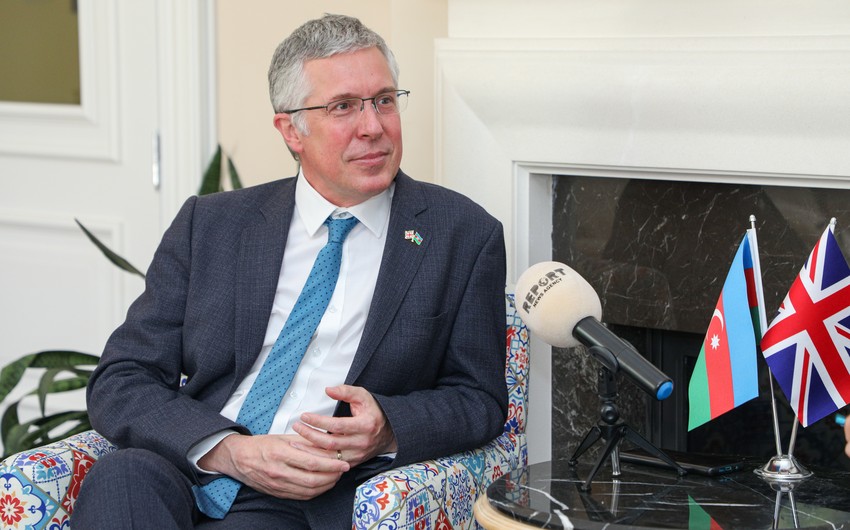 https://static.report.az/photo/00801efb-3807-3759-b8e1-7e9623d9b67a.jpg
https://static.report.az/photo/00801efb-3807-3759-b8e1-7e9623d9b67a.jpg

